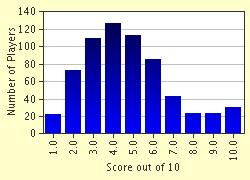Quiz Answer Key and Fun Facts
1. Do you ever succumb to the temptation to replace a plain word with something having a little more color? When you describe your "plain cat" as "that remarkable feline", in what activity are you engaging?
2. If, when you... ah, speak in front of people... er, it comes out... um, like this, what sort of SPEAKING problem are you afflicted with?
3. A newspaper hires you as their cruciverbalist. Which of the following will you be writing?
4. Tell me, my little apple dumpling, which of the following is a technical term for the way in which I just used "apple dumpling"?
5. If I obsessively make horrid puns, recount pointless stories and tell abysmal jokes, I may suffer from Witzelsucht, a disorder that can be caused by an underlying disorder of the frontal lobes.
6. Holy mind-boggling cow! I just inserted one expression right into the dead freaking center of another. In what practice have I engaged?
7. In what manner could the title of this quiz "Things To Do With Words" be taken as an example of "parisology"?
8. In writing a letter, where does one typically place the paraph?
9. You have written a quiz on some of the technical points of linguistics. From whom are you likely to receive an accurate, argumentative correction notice?
10. Using a plethora of overblown, exaggerated, inflated and overstated adjectives characterizes which of the following?
Source: Author
uglybird
This quiz was reviewed by FunTrivia editor
fringe before going online.
Any errors found in FunTrivia content are routinely corrected through our feedback system.


